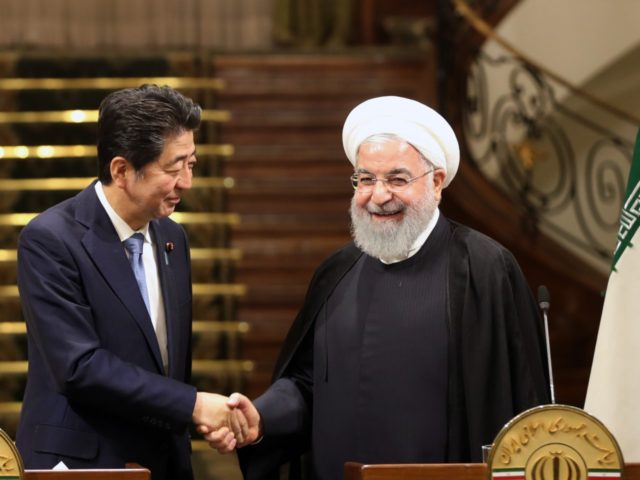Iran’s Supreme Leader Ayatollah Ali Khamenei dismissed visiting Japanese Prime Minister Abe Shinzo’s suggestion of diplomacy with the United States, stating that President Donald Trump did not “deserve” the courtesy, Iranian media reported on Thursday local time.
Khamenei reportedly emphasized he believed in Abe’s “goodwill and seriousness” in coming to Tehran in a bid to defuse tensions between Tehran and Washington, but rejected the idea of any further negotiations with America following President Trump’s withdrawal from the “Joint Comprehensive Plan of Action,” more commonly known as the 2015 Iran nuclear deal.
“I see no merit in Trump as a person to deserve the exchange of any messages, and I do not have any answer for him and will not give him any either,” Khamenei told Abe, according to Iran’s Tasnim News Agency. “Trump’s claim that he does not intend to change the regime (in Iran) is a lie, because he would do this if he was able to, but he can’t.”
Khamenei rejected Abe’s message from Washington that the United States is open to talks with the violent Islamic regime.
“We do not believe it at all, because sincere negotiations would not come from an individual like Trump,” he reportedly said. “Sincerity is very rare among the American officials. … We will by no means repeat the bitter experience of negotiations with the US in the past recent years.”
Khamenei also resurrected the longtime falsehood he passed a fatwa, or Islamic edict, banning nuclear weapons.
“We are opposed to nuclear weapons and my religious fatwa is that production of nuclear weapons is haram (forbidden), but be mindful that if we ever intended to produce nuclear weapons, the US would not be able to do anything, and the American rejection would not pose any obstacle,” Khamenei is quoted as telling Abe.
Abe came to Tehran – the first such visit by a Japanese head of government since the Iranian Revolution – with a message of “patience” to Iran.
“At the moment, tension is rising. We should do anything we can to prevent an accidental conflict from happening, and Iran should play its constructive role,” Abe reported remarked in comments published on Thursday following a meeting with Iranian President Hassan Rouhani. “There is [the] possibility of [an] accidental conflict, and a military conflict should be prevented at all costs.”
Iran welcomed Abe to the region with an attack on a Japanese oil tanker in the Gulf of Oman, which it denies involvement with but American officials published a video late Thursday of showing Islamic Revolutionary Guard Corps (IRGC) members removing mines from one of two ships attacked. Japan’s Kokuka Courageous and the Norwegian-owned Front Altair suffered explosive attacks early Thursday, neither lost any lives onboard, but both crews had to abandon the ships.
Iranian Foreign Minister Mohammad Javad Zarif claimed the United States had not “a shred of evidence” that Iran attacked the ships despite the video showing IRGC members removing the mine. The IRGC is a U.S.-designated terrorist organization. Iran claims its presence near the ships was in a rescue capacity.
Japan has ruled out a military response to the attack. Japan has not had a formal military since World War II, instead relying on its Self-Defense Forces (SDF) to protect it. Japan’s constitution severely limits the scope of actions the SDF is allowed to take to defend the homeland, limitations Abe has spent years campaigning against.
While not planning for military action, Japan has placed all its oil tankers in the region on high alert. Japan was once one of Iran’s biggest oil purchasers, hence its large presence in the region, but has complied with American sanctions on the Iranian oil industry and found new sources to feed its domestic demand. Washington sanctioned Iran last year in response to its significant expansion of terrorist activities in the region through proxies like the IRGC, Hezbollah, and Iraq’s Popular Mobilization Forces (PMF).
American Secretary of State Mike Pompeo left little room for doubt that Iran was responsible for the oil tanker attacks in remarks Thursday.
“It is the assessment of the United States government that the Islamic Republic of Iran was responsible for the attacks that occurred in the Gulf of Oman today,” he told reporters. “Taken as a whole, these unprovoked attacks present a clear threat to international peace and security, a blatant assault on freedom of navigation, and an unacceptable campaign of escalating tension by Iran.”
Pompeo dismissed the possibility that any other nefarious actor in the region would “have the resources and proficiency to act with such a high degree of sophistication.”
The Iranian government has rejected these accusations and instead made the claim that the United States is a threat to global security, not Iran. Foreign Minister Zarif claimed the attacks were the product of a conspiracy among National Security Advisor John Bolton, Saudi Crown Prince Mohammed bin Salman, and Israeli Prime Minister Benjamin Netanyahu, who he referred to collectively as the “B team.”
In a speech Friday, President Rouhani called the United States “a serious threat to the stability of the region and the world.”
“For the past two years, the US government has used its economic, financial and military power through an aggressive approach to disrupt all international structures and regulations, which has turned him into a serious threat for the stability of the region and the world,” Rouhani told an audience in Kyrgyzstan, where he was attending the Shanghai Cooperation Organization (SCO) summit.
Follow Frances Martel on Facebook and Twitter.

COMMENTS
Please let us know if you're having issues with commenting.